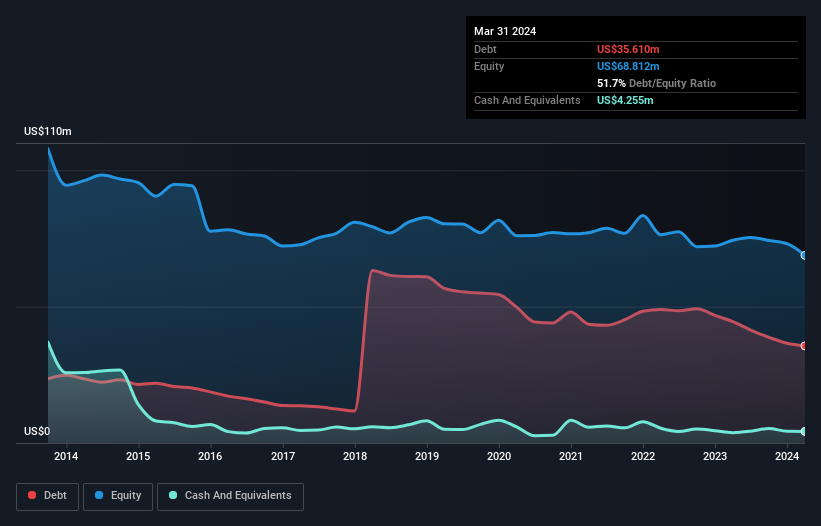- United States
- /
- Life Sciences
- /
- NasdaqCM:HBIO
Harvard Bioscience (NASDAQ:HBIO) Is Making Moderate Use Of Debt
Legendary fund manager Li Lu (who Charlie Munger backed) once said, 'The biggest investment risk is not the volatility of prices, but whether you will suffer a permanent loss of capital.' When we think about how risky a company is, we always like to look at its use of debt, since debt overload can lead to ruin. Importantly, Harvard Bioscience, Inc. (NASDAQ:HBIO) does carry debt. But should shareholders be worried about its use of debt?
When Is Debt Dangerous?
Debt assists a business until the business has trouble paying it off, either with new capital or with free cash flow. Part and parcel of capitalism is the process of 'creative destruction' where failed businesses are mercilessly liquidated by their bankers. However, a more common (but still painful) scenario is that it has to raise new equity capital at a low price, thus permanently diluting shareholders. Of course, debt can be an important tool in businesses, particularly capital heavy businesses. The first step when considering a company's debt levels is to consider its cash and debt together.
Check out our latest analysis for Harvard Bioscience
How Much Debt Does Harvard Bioscience Carry?
You can click the graphic below for the historical numbers, but it shows that Harvard Bioscience had US$35.6m of debt in March 2024, down from US$44.5m, one year before. However, it does have US$4.26m in cash offsetting this, leading to net debt of about US$31.4m.

A Look At Harvard Bioscience's Liabilities
According to the last reported balance sheet, Harvard Bioscience had liabilities of US$25.7m due within 12 months, and liabilities of US$38.7m due beyond 12 months. Offsetting these obligations, it had cash of US$4.26m as well as receivables valued at US$15.3m due within 12 months. So it has liabilities totalling US$44.8m more than its cash and near-term receivables, combined.
This deficit isn't so bad because Harvard Bioscience is worth US$123.3m, and thus could probably raise enough capital to shore up its balance sheet, if the need arose. But it's clear that we should definitely closely examine whether it can manage its debt without dilution. When analysing debt levels, the balance sheet is the obvious place to start. But it is future earnings, more than anything, that will determine Harvard Bioscience's ability to maintain a healthy balance sheet going forward. So if you're focused on the future you can check out this free report showing analyst profit forecasts.
In the last year Harvard Bioscience had a loss before interest and tax, and actually shrunk its revenue by 6.8%, to US$107m. That's not what we would hope to see.
Caveat Emptor
Over the last twelve months Harvard Bioscience produced an earnings before interest and tax (EBIT) loss. Indeed, it lost US$1.5m at the EBIT level. When we look at that and recall the liabilities on its balance sheet, relative to cash, it seems unwise to us for the company to have any debt. So we think its balance sheet is a little strained, though not beyond repair. We would feel better if it turned its trailing twelve month loss of US$8.7m into a profit. So in short it's a really risky stock. When analysing debt levels, the balance sheet is the obvious place to start. But ultimately, every company can contain risks that exist outside of the balance sheet. For instance, we've identified 1 warning sign for Harvard Bioscience that you should be aware of.
Of course, if you're the type of investor who prefers buying stocks without the burden of debt, then don't hesitate to discover our exclusive list of net cash growth stocks, today.
Valuation is complex, but we're here to simplify it.
Discover if Harvard Bioscience might be undervalued or overvalued with our detailed analysis, featuring fair value estimates, potential risks, dividends, insider trades, and its financial condition.
Access Free AnalysisHave feedback on this article? Concerned about the content? Get in touch with us directly. Alternatively, email editorial-team (at) simplywallst.com.
This article by Simply Wall St is general in nature. We provide commentary based on historical data and analyst forecasts only using an unbiased methodology and our articles are not intended to be financial advice. It does not constitute a recommendation to buy or sell any stock, and does not take account of your objectives, or your financial situation. We aim to bring you long-term focused analysis driven by fundamental data. Note that our analysis may not factor in the latest price-sensitive company announcements or qualitative material. Simply Wall St has no position in any stocks mentioned.
Have feedback on this article? Concerned about the content? Get in touch with us directly. Alternatively, email editorial-team@simplywallst.com
About NasdaqCM:HBIO
Harvard Bioscience
Develops, manufactures, and sells technologies, products, and services for life science applications in the United States, Germany, and internationally.
Fair value with mediocre balance sheet.
Similar Companies
Market Insights
Community Narratives


Recently Updated Narratives


MINISO's fair value is projected at 26.69 with an anticipated PE ratio shift of 20x


The Quiet Giant That Became AI’s Power Grid


Nova Ljubljanska Banka d.d will expect a 11.2% revenue boost driving future growth
Popular Narratives


The company that turned a verb into a global necessity and basically runs the modern internet, digital ads, smartphones, maps, and AI.


MicroVision will explode future revenue by 380.37% with a vision towards success



